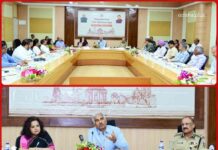Bhaskar Parichha
The increasing influence of the media has changed the shape of politics all over the globe. Consequently, it has raised provocative questions about journalism’s role in the political process. There are questions about the media’s effect on the political system and the subsystems- the legislature, the executive and the lobbies. Is media power in politics a myth or exaggeration? Who influences whom? When does the media power peak and when does it touch the bottom – these and similar questions, however, defy any clear cut answer.

Diverse in content
Research suggests that the media’s effect on politics cannot be answered in broad generalities. There are various types of effects, on various types of political dispositions, at various levels of political activity, under various conditions. Further, the mass media are highly diverse in content, of which politics is only a minuscule part.
In politics, the mass media influences individual opinion and politics. If political roles change, so do politicians’ expectations. Changes take place even between followers and leaders, and maybe even some of political life’s values.

Walter Lippmann, the renowned American journalist and political analyst, once said: Journalists point a flashlight rather than a mirror at the world. Accordingly, the audience does not receive a complete image of the political scene, it gets a highly selective series of glimpses of the scene. Reality is also tainted. It was his view that the media cannot perform the functions of public enlightenment that democratic theory requires. He reasoned that the mass media cannot tell the truth objectively because the truth is subjective. This entails more probing and explanation than the hectic pace of news production allows.
Images of reality portrayed by the media differ from country to country. Judging by their respective media, audiences form varied images of events and international ramifications. Different media produce different opinions. There is no commonality in which political actors and actions deserve the spotlight and should be regarded positively, negatively, or neutrally.
Influence also depends on the media’s credibility and the esteem with which their audiences regard them. A TIMES NOW story or one from INDIA TODAY will attract diverse opinions. So, credibility is the big thing in media exposures.
Nearly everyone acknowledges that the media play a powerful role in our public and private ves. Also, opinions about the media and estimates of their influence on society’s other institutions are important barometers on the other hand, attitudes about the media have at times been highly critical and critiques of the press have spanned a century and several continents.
Whether the media actually impedes the operations of the other three organs of democracy is difficult to say. However, as the Indian experience shows, the media have an abiding influence on the government and its institutions than the institutions have on the media.

American humorist Will Rogers said long ago, ‘all I know is what I read in the papers. For many Indian politicians there is a lot of truth in this aphorism-what they learn about ongoing political events comes primarily from the news media. Therefore, the media as a source of information molds public opinion and influences political decisions. If the media guides citizens’ attention to certain issues and influences their thinking process, it is obvious that the media influences politics. That, in essence, is the reasoning behind the agenda-setting hypothesis of scholars like Maxwell E. McCombs and Donald L. Shaw.
Agenda Setting Role
Agenda-setting or the ability of the media to influence the course of events in the public mind has been part of the political culture of the United States of America for nearly a century. The idea of agenda-setting asserts that the press’s priorities become the public’s priorities. What the press emphasizes is, in turn, emphasized privately and publicly by audiences.
In 1952 the Republicans led by Dwight Eisenhower successfully exploited the three s – Korea, Corruption and Communism – to regain the White House after a hiatus of twenty years. The prominence of those three issues, cultivated by press reports extending over many months and accented by partisan campaign advertising, worked against the incumbent Democratic Party.
There are numerous instances of how popular American presidents’ actions and statements reported in the media affected public opinion. These include President Nixon’s persistent opposition to accelerating troop withdrawals from Vietnam during 1969,1970 and 1971; Reagan’s 1981 argument about AWACS airplane sales to Saudi Arabia; Carter’s 1977-78 increased attention to Arab countries, his 1982 bellicose posturing towards the Soviet Union; Ford’s 1974-75 defense of military spending and Carter’s advocacy of cuts in domestic spending. In contrast, a number of unpopular presidents made serious efforts to advocate policies but failed to persuade the public.
In no area of public life have practicing politicians taken media effects more seriously than during elections. Political campaign organizers spend much time, effort and money attracting favorable media attention to candidates for major electoral offices. When their candidates lose, they blame media coverage or the lack of it.

Winning is everything
Systematically establishing the impact of election communication on public opinions and behavior is a real challenge. The nature of campaign coverage can have a profound impact on voting. This is confirmed by how people view the candidate – as the winner or loser. As for the media, that old line of legendary coach Vince Lombardi – Winning Isn’t Everything, It’s The Only Thing– is taken to heart and the public response usually follows suit.
Media affects politics and public policies in many ways. By mobilizing hostile opinion groups or interest group opinions the media may stop political choices. But, as a general rule, journalists should disclaim any motivation to influence public policies through their news stories. Except for the editorial pages, their credo calls for objective, neutral reporting. Only investigative stories may be the major exception to this rule.
Contemporary political folklore pictures the media as adversaries of officialdom who alert citizens to governmental misdeeds or failures. In reality, there are, or may occur, many situations when officials and journalists work together to take needed action.
News people’s power rests largely in their ability to select news for publication and feature it as they choose. Many people in and out of government try to influence media choices. But in the end, it is the editor and news directors –the gatekeepers in the news media- who decide which item to pass and which to kill.
(The author is a Bhubaneswar based senior journalist and columnist. Views are personal)

















